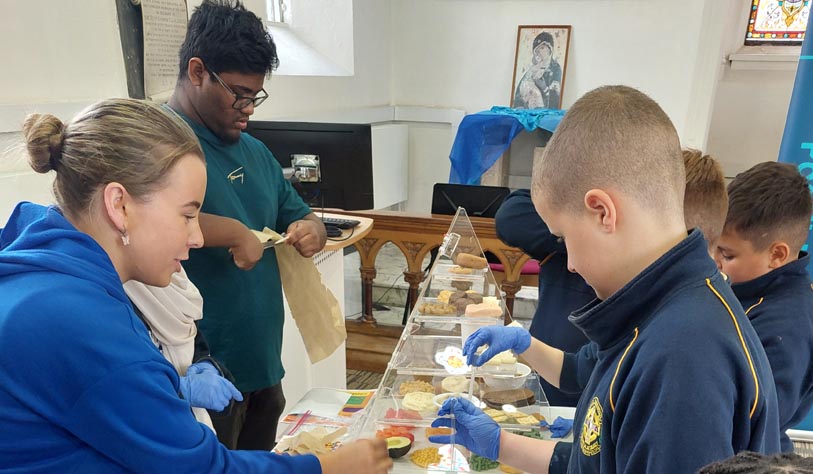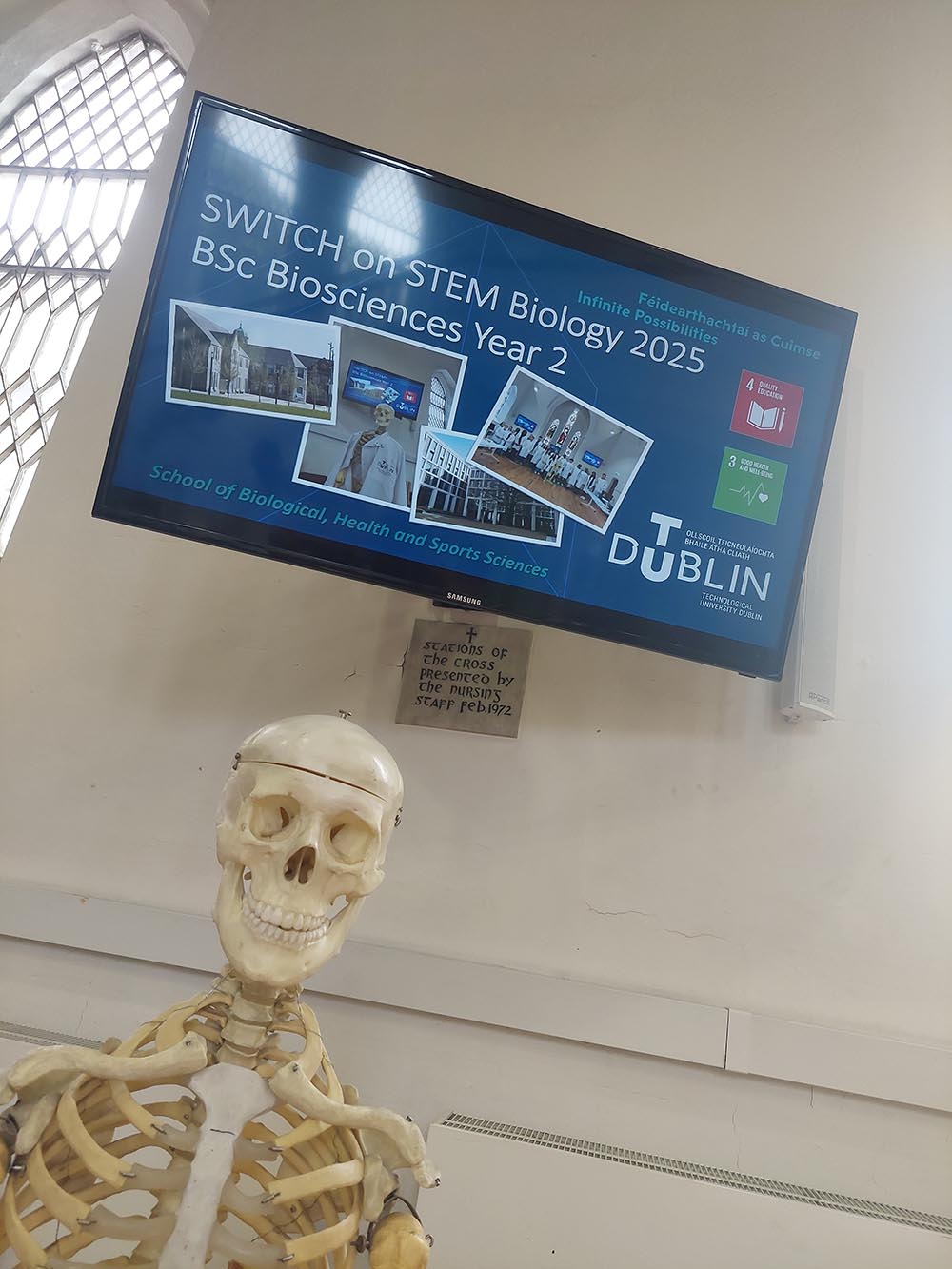Switch on STEM with Biology

In a rapidly evolving world where science and technology underpin almost every sector, from healthcare to climate resilience, the need for equitable access to STEM (Science, Technology, Engineering, and Mathematics) education has never been greater.
Yet the path to a career in STEM isn’t equal for all. According to the 2024 I Wish report, three in five girls believe gender inequality is the biggest barrier to pursuing a STEM-related career. The World Economic Forum echoed this in its 2024 Global Gender Gap Report, calling for a holistic, society-wide approach to address these systemic gaps.
At TU Dublin, the Switch on STEM with Biology project answers this call through engaged learning, early science exposure, and targeted support for children in DEIS schools (Delivering Equality of Opportunity in Schools). Led by School of Biological, Health and Sports Sciences lecturers, Dr Leanne Harris and Dr Shubhrima Ghosh, the project brings together second-year Biosciences (TU751) students, TU Dublin’s Access & Outreach, and three local primary schools: Christ the King Girls’ National School, St Audoen’s National School, and St Paul’s Primary School.
This project aimed to do two things: to break down barriers that limit young children’s access to STEM education, especially girls, and to provide TU Dublin students with meaningful, real-world experience in communication, collaboration, and civic responsibility. With a special focus on United Nations (UN) Sustainable Development Goal (SDG) 4: Quality Education and SDG 5: Gender Equality Switch on STEM aims to create learning experiences that are inclusive, hands-on, and impactful for students at all levels in the Irish education system.
Engaging young learners - Biology demonstrations
In Semester 2 of the 2024/2025 academic year, Biosciences students worked in 10 groups of 5-6 students to design engaging biology-themed demonstrations suitable for primary school-aged children. Drawing on their knowledge gained from their studies, students translated complex topics into simple and engaging experiments with real-world relevance. From microorganisms to the human immune system, and osmosis to the respiratory system, their goal was not just to teach science, but to inspire a generation of learners into the world of STEM.
Throughout the semester, Biosciences students refined their demonstrations and resources while building essential attributes such as collaboration, global citizenship, and life-long learning. They were supported by staff from both their academic programme and Access & Civic Engagement, who provided guidance while giving students ownership over their projects.
The result was a suite of 10 unique, 10-minute biology demonstration, each of which brought a different aspect of biology to life at a level appropriate for young learners.
In the same term, Access & Outreach Project Co-ordinator Ian Roller delivered a talk to students on the role of SLWC+ at TU Dublin, highlighting how civic engagement can foster mutually beneficial partnerships by broadening access to higher education and promoting the creation and sharing of knowledge.
Speaking about the project Dr Leanne Harris said: “The Switch on STEM project pushed both students and staff out of so-called ‘comfort zones’, but embarking on a project like this has granted us the bandwidth to become more engaged in the learning process. It has provided primary school children with and inclusive and equitable learning experience, exposure to university resources and opportunities and supports girls in science”
Science in action
The biology demonstration resources were put to the test on Friday, May 02, 2025. At a special event at TU Dublin’s St Laurence’s Church, Grangegorman, Biosciences students welcomed curious young minds from the participating primary schools for a bustling day of science in action.
Over the course of the morning, primary school students rotated through the mini-biology demonstrations, engaging with experiments, asking questions, and learning directly from TU Dublin students.
The demonstrations had names as fun as they were educational, Invisible Invaders’, ‘Nutrient Navigators’, DNA Buddies, Blood Cell Superheroes and more , covering key topics in food, living organisms, health and the human body. The children were challenged to identify blood cells, parts of the skeleton, and the digestive system using the anatomical models. In an opportunity to engage in hands on science they got to try out lab equipment; performing osmosis experiments; using microscopes; and they investigated the respiratory and cardiovascular system using stethoscopes. After each activity they were able to draw conclusions from what they observed and experimented with. TU Dublin students, in turn, acted as facilitators, teachers, and role models.

The feedback was overwhelmingly positive.
One primary school staff member said: “The students were great with the children, so warm, friendly and professional”.
A participating Biosciences student shared: “Several teachers commented on how well-prepared, enthusiastic, and organized we were. It was incredibly rewarding to see our effort pay off. This experience reminded me why I enjoy science communication and inspired me to look for more outreach opportunities in the future and be more involved in projects or research that are related to my field”.
For academic staff, it was a moment of pride, with Dr Leanne Harris saying: “Each year I am blown away by the dedication, creativity and abounding enthusiasm from our student cohorts in the School of Biological, Health and Sports Sciences. We are very proud of the hard work and effort that our students put into this event, communicating so effectively and professionally and contributing to sustainability in education”.
Lasting Impact: Supporting lifelong learning
Switch on STEM with Biology is more than a one-day event, it’s a model for sustainable, inclusive education. By opening University spaces to young children and connecting future graduates with their community, the SLWC+ project supports lifelong learning, fosters a love of science from an early age, and addresses equity in education and career pathways.
It also strengthens TU Dublin’s commitment to the UN SDGs, particularly SDG 4 and SDG 5, and also SDG 3, by nurturing skills and knowledge across age groups and backgrounds. For University students, the experience strengthens graduate attributes aligned with TU Dublin’s People, Planet, and Partnership framework, promoting leadership, adaptability, and civic engagement.
The intention is to continue and grow this collaboration, expanding to more schools and potentially more subject areas in the future. By giving children, a joyful and accessible introduction to STEM, and showing them that science is for everyone, Switch on STEM is creating ripples of change that may shape the careers, confidence, and curiosity of Ireland’s next generation of scientists.
In a single morning, the walls of the classroom disappeared with young students given the opportunity to imagine themselves as future biologists, while university students saw the power of their knowledge in action. Switch on STEM with Biology proves that impactful education isn’t limited to lectures and labs, it lives wherever curiosity and innovation is supported.

